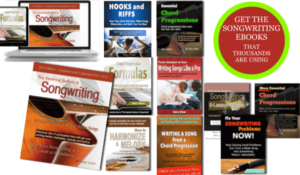Years ago, songwriting practically always meant sitting at a piano or with a guitar, with no assistance from a computer. For many, that’s still the case; songwriting, of course, need not happen at a computer at all.
Assuming you were planning on performing the song yourself, you and your band would then make some decisions regarding instrumentation and other performance issues (tempo, key, style, and so on).
 Need chord progressions? Get the ebooks that will give you hundreds of them. Read more..
Need chord progressions? Get the ebooks that will give you hundreds of them. Read more..
Production was a rather separate step, in which new decisions would be made regarding what the final recorded version would sound like.
But today, software has made it possible –and I would say technically easy — to do your own production. You can mix and engineer your music using your smartphone.
For those of you who write this way, the line between writing and recording has become somewhat blurry. More than ever, a songwriter — not a producer — is making important decisions regarding the sound of the final version of their song — not because it’s desirable to do it that way, but because it’s easiest, and because it’s less expensive.
If working hand-in-hand with your computer like this is how you write songs, be careful: the computer has a way of polishing everything, to the point where it’s easy to overlook bad songwriting.
So if you like to work closely with technology, here are 3 quick tips to be sure that you’re first getting the most out of your songwriting abilities:
- Write as much away from the computer as you can. Try “old school” – sitting with your guitar, and work out as much of the song this way as you can.
- Record your song with no instrumentation as a preliminary step. This gives you your best chance of hearing the bare bones of your song. Your song should work at this stage. If you find yourself saying, “Well, I can fix that at my computer…”, that’s the start of a slippery slope.
- Allow the structure of your songs to do what you’d normally rely on technology for. For example, if you want a build to happen as your song moves from verse to chorus, ask yourself, “What have I done in my song at that moment to help with that build?” Look at your melody, the rhythms of your lyrics, etc., and see if you’ve intensified musical energy before you start relying on technology to do that for you.
Computers are here to stay, and they can be a tremendous asset in the composing of music. They also make it possible for songwriters to take firmer control of the writing, producing and distribution of their music.
But never forget that the basic structure of music doesn’t change just because you’re using a smartphone or computer to help you. And sometimes, the best thing you can do is to step back from technology, to give yourself a better “view” of what your songs really sound like.
 Written by Gary Ewer.
Written by Gary Ewer.
There is a kind of logic that makes good chord progressions work. It’s not random. These chord formulas will make creating chord progressions so much easier. (This ebook is part of The Essential Secrets of Songwriting 10-eBook Bundle)












Pingback: Don’t Let Technology Fool You - The Hit Songwriting Formula | The Hit Songwriting Formula